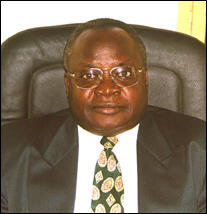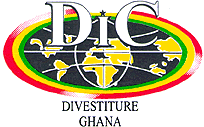
| 

|

 DIVESTITURE IMPLEMENTATION COMMITTEE (DIC) DIVESTITURE IMPLEMENTATION COMMITTEE (DIC)
Interview with
Mr. Emmanuel Agbodo,
Executive Secretary
October 6th 1999
Contact :
F.35/5 Ring Road East - North Labone
P.O.Box C102, Accra - GHANA
Tel: (233 21) 772 049 – 760 281 – 773 119
Fax: (233) 21 773 126
E-mail: dicgh@ncs.com.gh
Web-site: www.dicgh.com
|
Could you tell us what projects you are currently working on and what projects you are looking at for the future?
Currently we are working on the privatization of a number of the very large enterprises. One of them which we have advanced on is the Produce Buying Company which is a government company charged with the responsibility to buy cocoa from the farmers. Since we started the policy of liberalization of the internal marketing of cocoa a few years back a number of private companies have also registered. We do not really see why we should still retain a fully owned state enterprise also doing marketing so in line with the liberalization policy we have decided to float shares in the PBC, about 50% of those shares are going to be on the market. The intended beneficiaries are going to be the farmers, the employees of the company, individual Ghanaians and institutions. We are not aiming at any foreign participation at this time and we are far advanced. If things work as well we might have the floatation by the end of the year. The other one is the Electricity Company of Ghana. A lot of work has already been done for the transaction to take place and in this case it is intended that the distribution business of the ECG will be broken into 5 different business units and into each of this units, we will be seeking private sector participation. We have agreement with the World Bank and the IMF to have what we call the transactions advisor in place by December and by March 2000 we should be seeing real activity towards the privatization of the various business units. There are other arrangements about the Railways Corporation where concessions will be granted to the private sector operators to run certain aspects of the railway business in this country.
How many companies have been divested in the last year and how many do you see being divested in the next year?
Up to the end of last year about 212 companies had been processed. This year we have worked on a few small things and a number of big ones as well. For example we have just successfully concluded the sale of the remaining 35% government shares of the capital equity in the only cement company in this country to our Norwegian partners. We are processing the Ghana Oil Company as well and we are going to move on to sell shares in a number of palm oil plantations. There is also a timber processing company which we have also advertised and we may be able to conclude that at the end of the year to in the first quarter of next year. We need to bear in mind that privatization is a relationship between 2 people; the seller and the buyer. We as sellers can hope to do this within a given time frame but that hope will not be realized until we find a buyer who is ready to meet our demands within that time frame.
How do you actually look for buyers?
It is a combination of us looking and others coming to us and asking about what we have to offer. We place adverts both locally and internationally in the papers, telling every body which companies are ready to go and expecting investors to respond by giving us their proposals. We are constantly looking for means to improve our operations. If we identify any other means which will give us a more proactive relationship we will readily go for that. We have gone ahead to even develop a fairly good site on the web which carries a lot of things on the DIC and that is working well for us at the moment and we expect to update it to make it more informative for investors.
In your role as the evaluators of divestiture, do you think that the criteria set up are going to change in the future?
The evaluation of divestiture for us is something different from evaluating proposals. The proposals are the things we have established criteria for. We have preset criteria for the evaluation of proposals and in that evaluation we cannot place the same weight on the criteria for each organization. The case of the particular organization will determine how much weight we can give to a particular criteria. So the set of criteria at the end of the day will show 100% but the composition can vary from company to company depending on what our expectations are. It is a very dynamic situation and we look at it pragmatically. But the evaluation of divestiture itself for us means the assessment of divestiture and its impact, to see if we are achieving our objectives. Apart from the general evaluation we also have periodic impact assessment of the divestiture program. The results of the last one shows that privatization is bringing about more employment, higher levels of compensation for employees, high level of private investment into those enterprises.
| There are other companies like Private Enterprise Foundation, GIPC, Free Zones Board which are involved in the privatization process. To what extent do you work hand-in-hand with these organizations?
These companies do not do exactly what we do. GIPC and FZB are agencies involved in investment promotional attraction. However we do relate with these organizations in the sense that a company that we privatize here will enjoy the incentives that are provided for under the investment sector’s law. A company that we privatize which fulfills the requirements of the Free Zones Board can become a free zone company and benefit from incentives that the Free Zones Board offers. The PEF is interested in what we are doing because we are passing companies on from the government sector to the private sector and they are the umbrella body which covers the Ghana Association of Industries and the Chamber of Commerce.
What is the response from foreign private investors into Ghana?
The larger companies’ divestment have been done with foreign private investors because that is where you have the expertise and the much needed financial resources. The mining companies for example have gone to foreign investors. If you take the big manufacturing companies like the Tema Food Complex which is now GAFCO, the majority share holder and manager is a foreign company. Coca cola is now being managed by coca cola international. Even though in the number of transactions the companies that have gone to foreigners are not as many as those which have gone to local people, in fallow the foreign investors are the larger investors under the program. 70% of the transactions have been concluded with local investors while the remaining 30% have been done with foreigners either on their own or in joint-ventureship with the Ghana government or private Ghanaian individuals.
To what extent was the 3rd Pan-African Investment Summit, held a couple of weeks ago, a success for the DIC?
From the organizational point of view we think it was a great success for us. But from the professional side it was even more fulfilling in the sense that we had the opportunity to meet with other practitioners of privatization from all over the continent and from outside the continent. The experiences we shared with these people are experiences that we will cherish and use probably in improving our program. I think that the kind of reactions we have had showed that Ghana has done a fair amount of work from which they also can learn and adapt their programs accordingly. It is something that we need to be doing more often though we realize that even though problems may be identical, solutions must be tailor-made to suit our own individual requirements.
How do you see the future for DIC and the whole divestiture program in the next couple of years?
It is going to be a busy period and even more complicated. We are in the stage of dealing with the large companies, particularly the more complicated ones which are within the fields of the utilities. Privatization has not been easy in any part of the world and we know it is not going to be easy, that is why we need all the time and the patience to do it. If we rush through it we are going to make a lot of mistakes and we will have to reverse the whole thing which is going to be more expensive.
What would you say has been your personal biggest achievement since you have been the Executive Secretary of the DIC?
As I look round and see companies which were virtually dead before privatization came alive and contribute to the economic growth of this country, companies which had no employees now with so many of them, I take delight that I have contributed to the whole process. The whole program done so far offers me great satisfaction.
As you know Forbes Magazine targets more than 4 million readers, mainly businessmen. What is your final message to them?
Ghana has all that it takes to be an investment destination. We that stability, peace and more importantly the investor is assured of the safety of his investment. If you put your money here you have nothing to worry about. There are international arrangements that protect your investment and more importantly our own constitution gives the investor all the protection he requires. The time is now.
|
© World INvestment NEws, 1999.
This is the electronic edition of the special country report on Ghana published in Forbes
December 13th 1999 Issue.
Developed by AgenciaE.Tv |
|
|
|
| | | | | |
|

